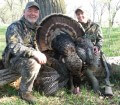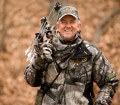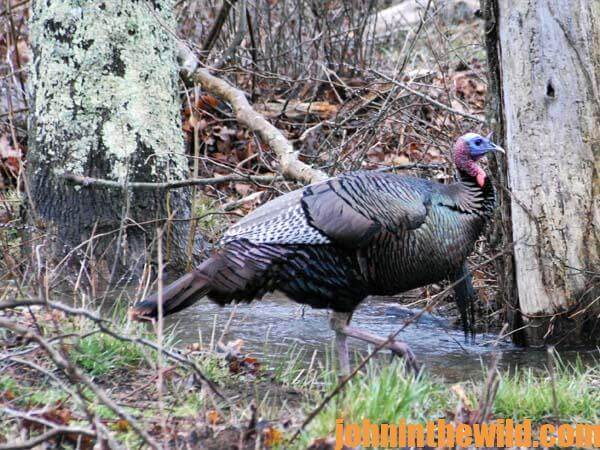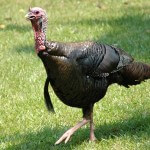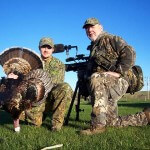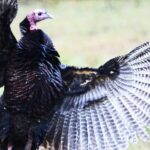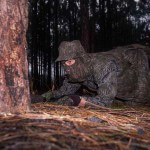John’s Note: Ronnie “Cuz” Strickland, Mossy Oak’s senior vice president of media services, probably has hunted turkeys as long and as hard as any man alive. He hunts for his own enjoyment, but in the early days of Mossy Oak (www.mossyoak.com), he was a cameraman, field producer, guide and caller. One of Cuz’s greatest joys in life is calling up a turkey for someone else to take. Cuz has hunted turkeys all over the world and in most states. When Cuz talks turkey, we all listen.
The late Ben Rodgers Lee of Coffeeville, Alabama, was one the greatest turkey hunters who ever lived.
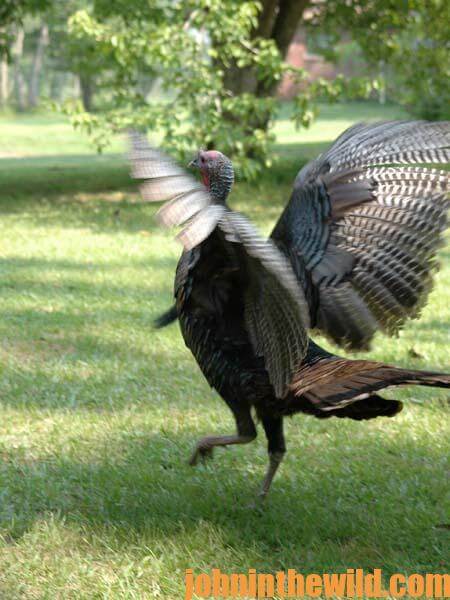 He was a five-time World Champion Turkey Caller, he weighed over 300 pounds, he hunted in tennis shoes, regardless of the weather conditions, and he moved through the woods like a ghost. If there was ever one man who went out as an evangelist for the sport of turkey hunting, it was Ben Rodgers Lee. Back in the 1960s, 1970s, and 1980s, Ben traveled all over the country teaching people how to call and hunt turkeys – during a time period that turkeys were being restocked in many states. Not very many people knew how to call or hunt turkeys. Ben would do seminars at sports shows and National Wild Turkey Federation (NWTF) chapters and in sporting-goods stores and appear on TV shows.
He was a five-time World Champion Turkey Caller, he weighed over 300 pounds, he hunted in tennis shoes, regardless of the weather conditions, and he moved through the woods like a ghost. If there was ever one man who went out as an evangelist for the sport of turkey hunting, it was Ben Rodgers Lee. Back in the 1960s, 1970s, and 1980s, Ben traveled all over the country teaching people how to call and hunt turkeys – during a time period that turkeys were being restocked in many states. Not very many people knew how to call or hunt turkeys. Ben would do seminars at sports shows and National Wild Turkey Federation (NWTF) chapters and in sporting-goods stores and appear on TV shows.
In one of those seminars, a man raised his hand and told Ben, “I found this big longbearded, gobbling turkey and watched him for awhile. He had more than 30 hens with him. I hunted him for a couple of weeks, and he never would come in to the call. Next I left him alone for 4 days. Then, I went back and tried him again. The second time he had 29 hens with him. I couldn’t get close enough to take a shot. What did I need to do to harvest that tom?” Ben smiled, looked at the man and said, “Go, find another turkey to hunt. Sometimes you need to know when to give up on a gobbler. Just because you haven’t called that turkey away from his hens doesn’t mean that turkey can’t be hunted. But to take that turkey, you’ll have to come back and hunt him during the time I call the window of opportunity.”
When a wild turkey tom wakes up in the morning and starts gobbling from the limb, I think he’s like a tightly-wound rubber band. If you see a turkey with a lot of hens, and you’ve tried to call to that bird and can’t pull him away from the hens, leave him, go hunt another turkey, return to that same area, try and call him again; or, come back late in the afternoon, and attempt to call him when his rubber band has loosened up. Another important key in being a successful turkey hunter is to know when to give up on a gobbler. There are some turkeys you just can’t harvest. They’re so smart and have been hunted so much that they understand more about the hunter than the hunter knows about them.
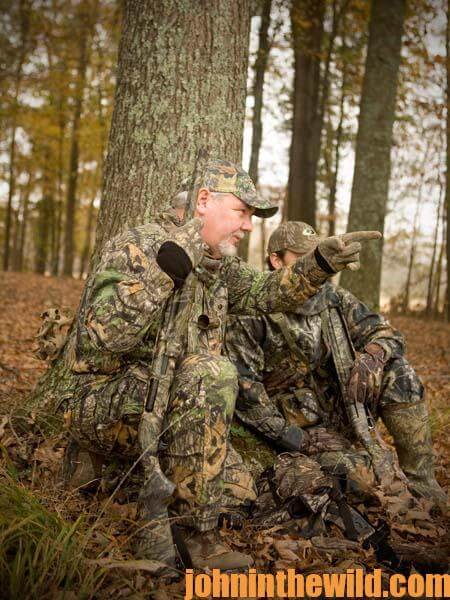 Another one of Ben’s favorite sayings was, “You’ve got to decide whether you want to call a turkey or take a turkey. If you want to call to the turkey, you ain’t going to take him. If you’re going to take the turkey, you may not need to call to him. You’ve got to hunt him like he’s a deer.”
Another one of Ben’s favorite sayings was, “You’ve got to decide whether you want to call a turkey or take a turkey. If you want to call to the turkey, you ain’t going to take him. If you’re going to take the turkey, you may not need to call to him. You’ve got to hunt him like he’s a deer.”
I’ve seen some hunters get so fixated on one turkey gobbler that they hunt that one turkey the entire season and never take him. Remember (in a previous post), I said, “Spend more time finding places to hunt than you do practicing with your turkey call.” There’s a very good reason that a turkey hunter needs to have several different turkeys to hunt during turkey season. If you find a turkey that you’ve worked on for several days, you’ve tried to take him, but haven’t been able to take him, then go, and hunt other turkeys on other properties. Give yourself and that bad turkey a period of time to be away from each other. Hunt some turkeys that will come when you call. Don’t continue to hunt a bad turkey every day of turkey season and lose an opportunity to take other easier gobblers.
One or two days during the spring, that bad bird may make a mistake and come into your calling – maybe. If you’re not there when that bad bird is ready to come to a call, you’re not going to take him. But don’t lose your joy, your excitement and the fun of turkey hunting by getting beat-up every morning when you hunt a bad gobbler. Learn when to walk away from that bird, and go hunt another gobbler, in another place, or on another property. To have a great turkey season and enjoy turkey hunting this spring, decide you’re not going to take a turkey every morning that you hunt them. Be thankful for the times you have an encounter with a turkey, and allow someone else to have a miserable hunt trying to take that turkey you can’t harvest. Most of the real turkey hunters I know love to hunt 2-year-old gobblers. Generally, they gobble a lot, and they like to strut and drum. Most of the time, they’re the easiest birds to call in to where you are.
I wish for all of you a great turkey season. If you’ll wear Mossy Oak camouflage and follow some of the advice that I’ve learned from other great turkey hunters, you should have a good season.
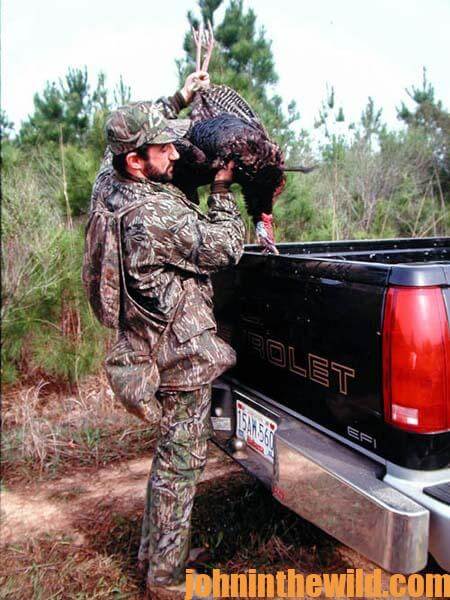 To learn more about turkey hunting from the masters, get these Kindle eBooks by John E. Phillips, including: “The Turkey Hunter’s Bible (available as an eBook or in paperback),” “PhD Gobblers: How to Hunt the Smartest Turkeys in the World,” “Turkey Hunting Tactics,” “How to Hunt Turkeys with World Champion Preston Pittman,” “The 10 Sins of Turkey Hunting with Preston Pittman,” and “Outdoor Life’s Complete Turkey Hunting.” Click here to get these books.
To learn more about turkey hunting from the masters, get these Kindle eBooks by John E. Phillips, including: “The Turkey Hunter’s Bible (available as an eBook or in paperback),” “PhD Gobblers: How to Hunt the Smartest Turkeys in the World,” “Turkey Hunting Tactics,” “How to Hunt Turkeys with World Champion Preston Pittman,” “The 10 Sins of Turkey Hunting with Preston Pittman,” and “Outdoor Life’s Complete Turkey Hunting.” Click here to get these books.

